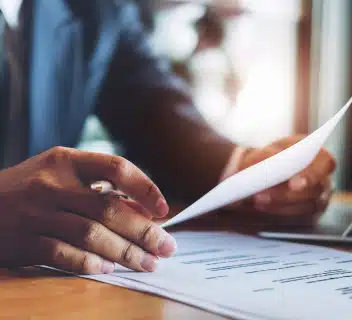Strengthen Your Auto Accident Claim
You may be able to file a personal injury claim for compensation if you have been the victim of an auto accident caused by another driver’s negligence. Your attorney will need to prove that the other driver caused the collision and that you suffered tangible damages. These damages refer to injuries that required medical attention, out-of-pocket costs related to your injuries, lost wages due to your injury, pain and suffering due to the accident, etc.
The actions you take immediately following an accident can have a lasting affect on your claim and the compensation you receive. In order to help maximize your compensation and protect your rights 1-800-THE-LAW2 is breaking down 10 steps you should follow to help strengthen your auto accident claim.
10 Steps You Can Take to Strengthen Your Auto Accident Claim
- Call 911 immediately. The other driver may try to convince you to settle with them on the spot, but you need to make an official accident report even if the damage is minimal. While you may feel fine at the scene, your body may suffer pain after a few days and you’ll regret not getting an official report.
- Remain calm and caring. Making the effort to comfort others while you wait for authorities to arrive is not only a nice thing to do, but it will help others view you as a caring individual. Just be sure not to make statements that may admit to your own negligence.
- Exchange information with the other driver. Ask to see their license and insurance card. Write down the information on the cards and ask for contact information.
- Take photos and videos on the scene. Take pictures from every possible angle. Record the scene on video so you and your attorney can refer to it at a later date in case you cannot remember precise details. Be sure to get images/video of all vehicles involved in the collision.
- Record any conversation you have with the driver, in case they openly admit fault. You can use these statements as evidence during a trial or settlement talks if they suddenly claim the accident was your fault
- After you have finished taking pictures and recording the scene of the accident, approach witnesses and ask if you can get their names and contact information. Ask a witness to write down what they saw, but if they don’t have the time, ask if you can record a video of what they saw as an alternative.
- Get a police report which is usually available a few days after a collision. The report will include a description of the accident, a diagram of the scene, and the officer’s assessment of fault.
- Accept medical care at the scene of the accident. Sometimes adrenaline can mask the pain of a serious injury so allow the paramedics to check you out and determine what kind of treatment you need.
- Meet with an attorney. You can contact 1-800-THE-LAW2 for a free consultation with an auto attorney who can advise you on the best way to deal with your case. Your attorney will handle all the details related to your case, such as contacting the driver’s insurance company.
- Seek follow-up medical treatment for injuries you sustained and keep copies of all records and receipts.
To help strengthen your auto accident claim, consult with an experienced and knowledgeable auto accident lawyer from 1-800-THE-LAW2 for free. Our bilingual representatives are available 24 hours a day, 7 days a week, 365 days a year to take your call.
10 Things to do After a Car Accident
According to the National Safety Council, there were an estimated 40,000 deaths in 2016 due to motor vehicle crashes. That number is a 6% rise from 2015 and a 14% increase in deaths since 2014. In addition to these fatalities, the Council also estimates 4.6 million serious injuries as a result of road injuries resulting in costs of about $432 billion.

Car accidents can be traumatic experiences, not only for the injured but also for their families, friends, fellow passengers, and pedestrians. While you can never truly be prepared, there are certain steps you can take to ensure the best outcome in terms of financial liability. Here is a list of 10 things to do after an accident:
Check on the status of passengers.
Human injuries require more immediate attention than damage to your property. Try to assess the extent of everyone’s injuries so you can accurately direct medical personnel to those who need attention first. Avoid moving unconscious individuals or those with neck/back pain as doing so may actually end up causing more harm than good.
Stay at the scene.
Even if you are involved in a minor incident, wait until the authorities arrive to give your account of the events. Driving away may cause you more headaches, especially if someone has been seriously injured. You may face serious criminal penalties for fleeing the scene.
Call the police.
Even if there are no serious injuries, calling the police can help protect your rights when it comes to filing a claim with your insurance company. In the event of any kind of accident, pedestrians or witnesses may call the police themselves even if you and another driver agree to handle matters yourself. You should still be prepared to answer their questions and cooperate. For serious accidents that involve injuries, expect to give a statement about what you saw and the actions you took.
Provide an accurate statement.
Tell investigators your account of events to the best of your ability. If you can’t recall specific details, be honest instead of guessing. When asked about any injuries you have sustained, it’s better to say that you are unsure instead of writing off the possibility because injuries from auto accidents may take days to materialize.
Take pictures.
Use your phone to take pictures of specific areas of damage, the position of vehicles, the cross streets, and even shots of witnesses who are standing around. The scene of an accident can be hectic and confusing, so it’s natural that you may be unsure of exact details. Having images to look back on can provide clarity. If the accident leads to court appearances, you can also use pictures as evidence, or your attorneys can try to find witnesses to testify on your behalf.
Exchange information.
Cover all your bases by getting the names, addresses, and numbers of all persons involved in the accident – drivers, passengers, and pedestrians alike. You should also make note of the name of the officer who took your statement and their badge number. Obtaining accident reports or following up on the status of the report will be easier if you have these details handy.
Seek medical attention.
Seek medical attention at the scene of the accident, or immediately after at your local emergency room. Even minor accidents can cause serious injuries to your back or spinal cord.
Talk to witnesses to get an idea of what he or she saw.
Get names, numbers, or addresses if possible. You never know if the other driver will file a claim against you and having witness details can help.
Keep a file of all your accident-related documents and information.
This includes police documents, pictures, witness details, medical bills, medical statements, the claim documents related to your case including the name of the claim adjuster, receipts for rental car expenses, and other expenses incurred because of the incident.
Hire an attorney.
If the accident caused serious injuries to any party, having a lawyer to represent you will alleviate some of your stress. Work with a lawyer who is experienced when it comes to personal injuries so they can get you the best settlement.
Get the Most from Your Auto Accident Claim
Dealing with insurance companies after an auto accident can be difficult and stressful, especially if you or a loved one has injuries resulting from the accident. Insurance companies may try to take advantage of you, and give you as little for your auto accident claim as possible. To get the most out of your auto accident claim, it is essential to remember these tips when dealing with insurance companies after an auto accident.
Dealing with Insurance Companies to File an Auto Accident Claim
What to do:
- Call police immediately: It is important to call the police immediately, especially if you suffered injuries in the accident.
- Gather as much evidence as possible: Gathering contact and insurance information, as well as taking pictures of the accident can help you get the most out of your claim. If there are any witnesses, make sure you gather their contact information to strengthen your case.
- Call your insurance company to report the accident: When calling your insurance company, give only the basic facts of the accident. Don’t give too much information without consulting with a lawyer.
- Seek medical attention, or contact your doctor for an appointment: If you are injured, or think you may be injured see a doctor right away. You may have injuries you do not know about, or injuries that will continue to worsen if untreated.
- Call 1-800-THE-LAW2: An experienced 1-800-THE-LAW2 auto accident lawyer could maximize the compensation for your auto accident claim. According to a study published by the Insurance Research Council, those who hire an attorney get almost 3.5 times more compensation from insurance companies.
What not to do:
- Make any recorded statements: If you are called upon by insurance companies to make a recorded statement, don’t give one until you have consulted with a lawyer. A 1-800-THE-LAW2 auto accident lawyer will guide you through what to say, so your statement doesn’t hurt your auto accident claim.
- Make a statement to the other party’s insurance company: Making a statement to the other party’s insurance company may affect your auto accident claim negatively. Their job is to protect their client.
- Sign any forms without consulting with a lawyer: By signing forms, you may be signing away your legal rights. A lawyer will make sure you aren’t signing any forms that will prevent you from receiving full compensation for your auto accident claim.
- Accept insurance company’s check: You may have a medical injury that does not show up immediately, and by accepting the company’s check early on, you could be prohibiting yourself of getting the full compensation for your injuries. Once you accept the check, you cannot ask for more compensation.
- Rush to accept an offer: Accepting the first offer may mean you are accepting a smaller compensation than you deserve. If an insurance company thinks you are unaware of how much your claim is worth, they may offer you less.




